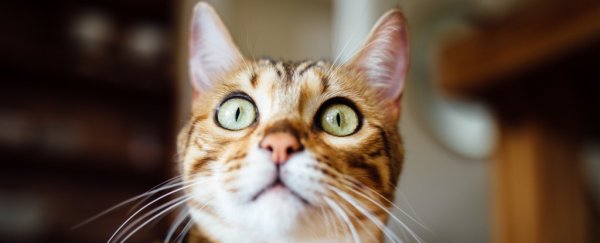A protozoan parasite found in cats could be having a rather odd effect on the brains of humans it infects, which under the right circumstances just might turn them into the next Elon Musk.
Toxoplasma gondii is famous for messing with the minds of mice, robbing them of the ability to evaluate risk. There's some circumstantial evidence hinting at a similar effect on our own minds, which although tenuous, is well worth a closer look.
Research led by the University of Colorado has combed databases of information examining the coincidence of T. gondii infections and entrepreneurial activity across the globe.
They also turned to students and business professionals for a simple spit-test to track their body's history of Toxoplasma gondii.
The research team was looking for some hint that there was a relationship between the go-getting, risk-taking characteristics of business hot-shots and a past brush with the mind-bending parasite. Which was pretty much what they found.
Almost 1,500 students who tested positive for exposure to T. gondii were 1.4 times more likely to be a business major. They were also 1.7 times more likely to have an emphasis on 'management and entrepreneurship'.
As for the 197 business professionals the researchers evaluated, being T. gondii positive made them 1.8 times more likely to have started their own business at some point.
Country-level databases on infection rates over the past 25 years also showed an interesting pattern – there was a consistent pattern where infections could be used to predict business startups, as well as a lower reported fear of failure.
At face value, we could assume Toxoplasmosis might do weird things to the brain, potentially lowering inhibitions that might make the rest of us a little more concerned about the risks of sinking time and money into a new venture.
After all, the microscopic cat-borne pathogen responsible for the disease can turn the average cowering mouse into a rodent that shows no aversion to the smell of cat, while causing them to forget where they are.
It's thought this could be an evolved characteristic, helping the parasite jump between cats through their food supply.
This raises the question of whether there's a similar neurological effect on humans. It certainly seems to play havoc with our immune system, rewiring our inflammatory response in order to survive.
But our own brains?
On one hand, we're hardly cat food. On the other, mice are often used as miniature models of human biology – the development of similar symptoms in us isn't inconceivable.
Some studies hint that a T. gondii infection could make some people more aggressive. But the numbers aren't convincing, and counter studies have failed to make links between psychological conditions or personality traits and the disease.
This new approach suggests something more subtle could be going on – an influence that isn't significant enough to give rise to serious psychological conditions, but one that could still potentially nudge people into throwing caution to the wind.
It's not the first study to step back and look for subtle signs of the parasite's gentle persuasion across a culture.
Other studies have noticed a correlation between infection rates and neuroticism, for example.
Others have found a negative link between T. gondii and economic performance, suggesting what makes some people risk-takers could increase insecurity and low ability to trust, weakening institutions rather than helping them grow.
The usual caveats concerning correlations apply here, and it's important not to take the sum of research together in drawing conclusions.
Nobody is suggesting you should go out and buy your kids a cat in the hope it will infect them with the skills to help them to take over Silicon Valley.
Nonetheless, the study does provide an interesting perspective on the ways epidemiology can have a small but powerful force on the psychology that builds culture.
And maybe, just maybe, shows why cats deserve their place of worship on the internet.
The findings are due to be published in Proceedings of the Royal Society B (link down at time of writing).
